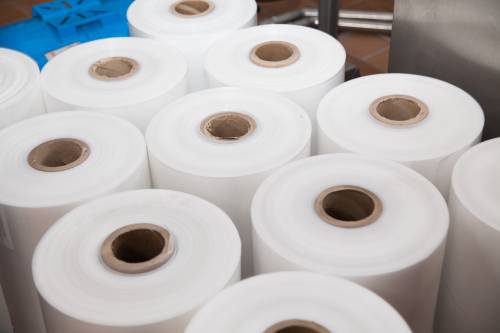
It is commonly believed that plastics are detrimental to the environment in a multitude of ways, with many people beginning to adopt paper or cardboard in its place. However, polythene can actually be beneficial in the food industry: reducing waste; prolonging the life of fresh produce, and even reducing carbon emissions in its creation and disposal. Rather than turning away from polythene, more manufacturers are actually moving towards using polythene packaging, including the magazine industry.
Reducing Food Waste and Preserving Fresh Produce
One of the ways through which polythene benefits the environment is in helping to reduce food waste. Of course, zero waste is not a realistic goal, but food waste can be minimised. A 2016 review by the European Commission discovered that 88m tonnes of food is wasted every year in the EU, with each tonne of food waste equating to 4.5 tons of carbon dioxide emissions: any means to minimise this waste is extremely important for environmental protection.
The British Plastics Federation states that barrier plastics, such as polythene, provides produce with a shelf-life of around 18 months. Food is produced and transported in high numbers, often being stored until it is needed. The amount of time from the initial production of the produce to its consumption cannot be predicted, and varies greatly, thus making the use of polythene packaging (in place of harmful preservatives) vital.
We can view plastic as a necessary evil in reducing waste, as Zero Waste Scotland has suggested that the carbon footprint of plastic might actually be lower than that generated by food waste – some predictions state that food waste produces three times the amount of carbon dioxide than plastic waste. Fortunately, the use of polythene in segregating food waste can aid in decreasing the carbon footprint of both plastics and food waste.
Segregating food waste:
Clearly-marked compostable plastic sacks and bags can be used to indicate the separation of food waste from other waste. This allows both kinds of waste to be transported, recycled, or reused more efficiently and correctly. As a result, food waste can be composted, ultimately recovering energy and replenishing soil. Alternatively, waste can be reused as food for animals, or, in some cases, transformed into bioenergy through anaerobic digestion.
Reducing carbon emissions:
Rather than contributing to increased carbon emissions, like the extraction and transportation of scarce crude oils in the making of polymers, polythene is made from natural gases. The gases are pumped into a plant where ethane is extracted and heated to form ethylene. Natural gases are widely abundant, and do not belong to any specific environments.
Indeed, this material is both easy to transport, and, due to its copious nature, requires much fewer air miles to transport than other raw materials. The final product is also easy to move. For example, the transportation of paper and cotton bags requires more than 7x the number of lorries to transport, and containers to store, than plastic bags: plastic is lighter and occupies less space than popular alternatives.
Perhaps surprisingly, polythene is also one of the most environmentally safe materials when breaking down after disposal:
Compostable polythene bags are frequently used in compost and food waste bins. These compostable bags break down into carbon dioxide, water, and biomass at an equal rate to cellulose (the molecule in the walls of plant cells). Abbey Polythene supply a range of compostable polythene bags in many sizes.
Biodegradable plastics break down in sunlight or air with the aid of bacteria. Whilst they can be recycled, they are often thrown in with normal, non-biodegradable plastics, and then transported to landfills lacking in sunlight, air, or the correct bacteria. Therefore, the issue here is not that this polythene cannot break down in an environmentally-friendly manner, but that biodegradables are too often not correctly disposed of.
Consequently, when polythene is transported, used, and disposed of correctly, it serves as a practical and environmentally-friendly material for food storage and waste.
Abbey Polythene supplies food waste polythene bags and sacks across the UK. Check out our website for our full range, or feel free to contact us with any questions or queries.
Sources:
https://www.abbeypolythene.co.uk/why-polythene-is-essential-in-the-food-industry/
https://www.abbeypolythene.co.uk/polythene-and-its-use-in-the-food-industry/
https://link.springer.com/article/10.1007/s40093-019-00300-z